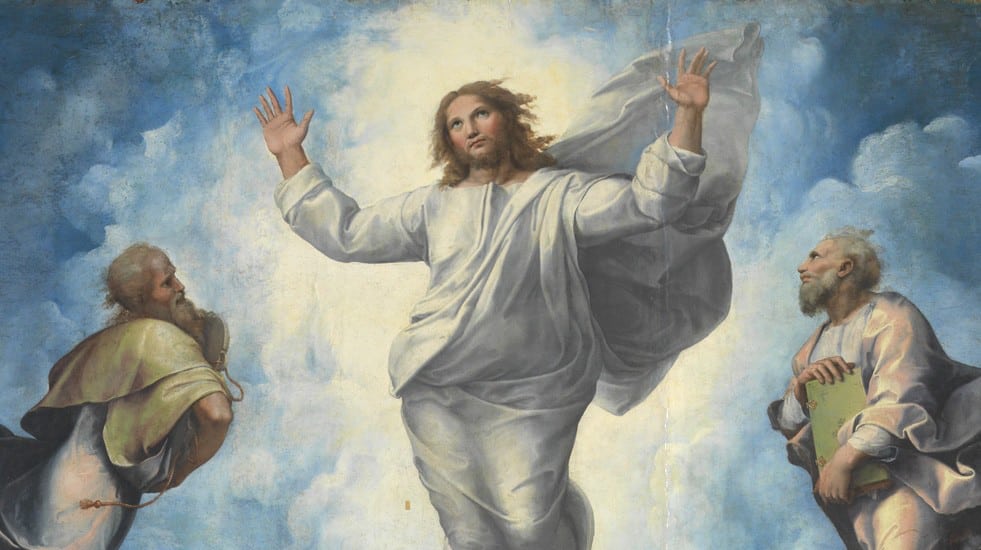There must be something so very important for our spiritual life in Jesus’ Transfiguration that the Church offers it to our consideration not once, but twice a year, on the second Sunday of Lent and on August 6. I believe that the reason is found in the opening statement from 2 Timothy (1:8-10):
Bear your share of hardship for the Gospel with the strength that comes from God.
The hardships that we, personally, and our loved ones have to bear, most likely, leave us bewildered, disoriented, depleted of inner energy and hurting. This happens even before we might be ready to bear some of higher-level hardships that the Gospel entails.
Indeed, already in ordinary, everyday life, we run into low-level hardships that have the power to overwhelm us and put a big damper on our inner disposition. That must be the reason why the Church uses the event of Jesus’ Transfiguration as a pattern for the gradual Transfiguration of each one of us: the Transfiguration of Jesus the Head is offered as the template for the Transfiguration of us as members of His Body.
The older I get, the more I realize that life is a mystery blessed with much joy but also riddled with mounting, troubling questions and with considerable pain. However some of that pain could, should be avoidable through wholehearted adherence to the Gospel. And as for the share of pain that is unavoidable, adherence to the Gospel provides us with the right attitude to bear it in imitation of Christ Jesus.
This is so decreed from above, because the mystery of life is lived, daily, within the much bigger mystery that is God Himself. If we forget this, we are bound to ask some troubling questions that add to the mystery of life:
Why do we play games of pretension and presumption?
Why do we do very foolish things and refuse to own up to them or to desist?
Why even good people, with the best intentions in mind, hurt repeatedly those who love them the most?
Why, occasionally, do also good people allow their worst side to take over and let themselves be ruled by pride and/or by unruly passions?
Why would also well-intentioned people stop their ears, close their minds and shut their hearts when told the honest, unvarnished truth? Why, why, why?
Obviously, before we can bear the hardships that adherence to the Gospel, love for Jesus and for the Church require, we have to learn how to handle the common, ordinary hardships that can spoil our inner attitude and fill us with bitterness. And, obviously, before we can think of refining our spiritual life we need to settle our hearts and shed some badly needed light onto our confused and disoriented minds.
Thankfully, today, the Church points us in the direction of grace, of God’s quiet, yet effective straight intervention in making sense of life and in anchoring our shaky existence in His love for us. Amid the many questions of life, amid the mystery that envelops us, we must find some solid ground on which to stand.
First of all, we should realize that our personal Transfiguration begins once we walk down from the lofty mountain of that inspiring vision of Jesus’ glory. At the foot of that mountain, we are never alone: Jesus is with us also through all those dreadful things that frighten us; through whatever makes us spend sleepless nights, argue with each other and, perhaps, even hurt each other. If, with Peter, we can say that it is good for us to be with Jesus on that mountain, we ought to admit that it is good to be with Him also on the plain, where we are engaged in all sorts of activities and we are frequently enveloped by darkness and get upset.
The second fact we ought to embrace is that some of the answers about the mystery of life within the bigger mystery of God Himself are found in listening to Jesus, God’s beloved Son.
They are found in living out the Gospel.
It is simply imperative that, whenever we are spent, depleted of energy, confused, hurting we take refuge in the spiritual corner of our home and we soak in Jesus the way a sunbather soaks in the sun.
By “our spiritual corner,” I mean the corner of our home to which we are drawn to be close to the Crucifix, the Bible and a statue or picture of the Blessed Mother with the Infant Jesus and where we can lay down and close our eyes so as to listen to Jesus in a very quiet, intimate setting.
If we cannot find some time during the week, at home, to dwell on Jesus, God’s Word of life, we must, at the very least, listen to Him here in church every single Sunday, without fail.
His Word has tremendous power to complement the awesome energy that we draw from Holy Communion.
At this point, once we are keenly aware that Jesus is with us around the clock and that He feels all our pain and darkness, we might be asked to move out of our comfort zone and begin to bear the hardships for the Gospel over and above those that are part and parcel of daily life. This is what God ordered Abraham (Genesis 12:1-4) to do even though he was 75 years old, set in his ways and comfortable with his lifestyle.
However, as I mentioned more than once already, from what you tell me, I can say with confidence that some of you are in so much pain and in such severe anguish already that they do not need to move out of any comfort zone.
They just need the reassurance of Jesus’ presence in their life.
Thus, as our Transfiguration progresses ever so slowly, we shall become attentive to the words of comfort that Jesus whispers to our soul and to the subtle inspirations of the Holy Spirit who strengthens and readies us for the higher-level hardships we have to bear for the sake of the Gospel.
The way we handle those hardships will be an effective manner of preaching the Gospel with our life.








